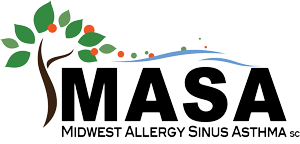
Warmer temperatures, blooming flowers, and more sunshine signal the end of winter. Many people look forward to the changing seasons, but if you have seasonal allergies, spring may not bring excitement.
Instead, it can bring unpleasant symptoms like itchy eyes, congestion, and sneezing. Seasonal allergies, also called allergic rhinitis, affect 20 million American adults and 6 million children.
Living with seasonal allergies can make you miserable, but if you start now, the arrival of spring won’t mean you have to hide inside. Let Dr. Dareen Siri and her team of talented advanced practice providers — Dana Dalbak, PA, Kat Lally, NP, Caitlyn Fox, NP, Tamara Reeter, NP, and Dr. Robert Kaufmann, MD — at Midwest Allergy Sinus Asthma help you find relief from seasonal allergies.
Get our best tips for treating spring allergies early — before they make you miserable. Book an appointment online or call one of our seven Illinois locations today.
Understanding seasonal allergies
Seasonal allergies are caused by allergens in your environment. In winter, there are fewer allergens because plants and trees aren’t growing. But in the spring, they begin releasing pollen.
Pollen from trees and other plants, along with mold spores, travel through the air as a fine powder. If you’re allergic to pollen or mold, your body reacts dramatically when you encounter these allergens.
Your body releases histamines to fight off the allergen, and you experience seasonal allergy symptoms. The most common symptoms of seasonal allergies include:
- Itchy eyes
- Watery eyes
- Nasal congestion
- Swollen sinuses
- Runny nose
- Sneezing or coughing
- Scratchy feeling in your throat
People with severe seasonal allergies might experience additional symptoms related to the sinus pressure caused by congestion. These include sinus headaches, earaches, facial pain, or loss of sense of smell.
How to prevent your allergy symptoms in the spring
If you know you suffer from seasonal allergies, don’t wait until you’re miserable to find a treatment that works. You can’t completely prevent your exposure to allergens, but there are a number of steps you can take to limit contact and reduce your symptoms.
Find out what you’re allergic to
At Midwest Allergy, Sinus, Asthma, we can help you identify the types of pollen and mold that you’re allergic to. Once you know your allergy triggers, you can check daily weather reports to see pollen counts. Staying inside when pollen counts are particularly high can help keep allergies at bay.
Pollen counts are generally lower later in the day or after it rains. Enjoying the great outdoors at these times can minimize your exposure to allergens.
Take steps to keep your living environment allergen-free
Always shower before you go to sleep, especially if you’ve spent time outdoors. Your skin and hair can collect pollen that may continue to bother you even after you go indoors. Using a HEPA filter inside your home, along with vacuuming and dusting regularly, can help keep your living environment allergen-free.
Find allergy medication that works for you
Allergy medications work to address symptoms of allergies or minimize your body’s response to allergens. Oral antihistamines, nasal decongestants, nasal steroid sprays, and eyedrops can all make symptoms improve and help you feel better.
Spring doesn’t have to mean living with the unbearable symptoms of seasonal allergies. Contact us today by phone or online to make your first appointment.
